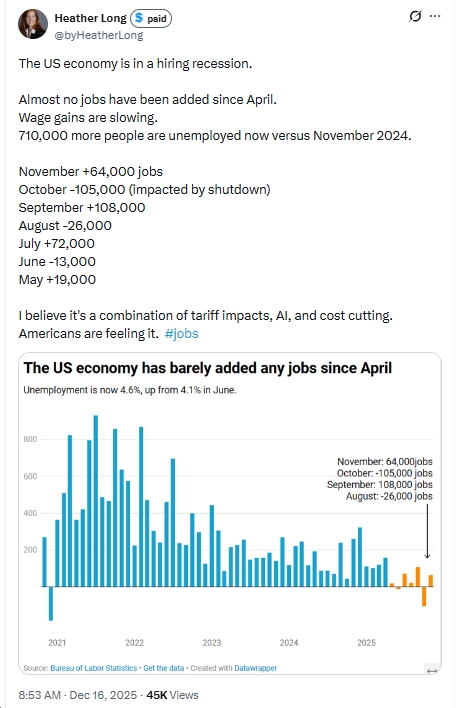 His column is titled We are the 99.9% and it is very much worth your time. As he writes, according to a CBO report which only examines data up to 2005 (and it has gotten worse)
His column is titled We are the 99.9% and it is very much worth your time. As he writes, according to a CBO report which only examines data up to 2005 (and it has gotten worse)
between 1979 and 2005 the inflation-adjusted, after-tax income of Americans in the middle of the income distribution rose 21 percent. The equivalent number for the richest 0.1 percent rose 400 percent.
And if we look at Capital Gains taxes, currently at only 15%,
taxes on capital gains are much lower than they were in 1979 – and the richest one-thousandth of Americans account for half of all income from capital gains.
Given this history, Krugman asks a very basic question, why do Republicans advocate further tax cuts for the very rich even as they warn about deficits and demand drastic cuts in social insurance programs?
Please keep reading.
Krugman thinks that .1%, the top thousandths, is grossly overpaid – and undertaxed.
Let’s take the first point. Some argue these wealthy are entitled to it, they are the innovators, the job creators. Krugman wriste
For who are the 0.1 percent? Very few of them are Steve Jobs-type innovators; most of them are corporate bigwigs and financial wheeler-dealers. One recent analysis found that 43 percent of the super-elite are executives at nonfinancial companies, 18 percent are in finance and another 12 percent are lawyers or in real estate. And these are not, to put it mildly, professions in which there is a clear relationship between someone’s income and his economic contribution.
Of course, even though Krugman thinks the man making $30,000 is as entitled to his share of the wealth created as the executive making $30,000,000. Unfortunately, that has never been true in the U. S. And anyone who raises that idea will be accused of being a Socialist or a Communist.
Similarly, our tax structure has for far too long favored those who already have, regardless of how they obtained it. Never mind that in 1944-1945 the incremental tax rate was 94%, because even the wealthiest understood that were we to lose the War their wealth would not be secure. And while the rate dropped briefly thereafter – to 84.5% – it went back up to 91% in 1951, reaching 92% in 1952-53, dropping again t0 91%, where it stayed through 1963. Then it was lowered – to 70%, or twice the current top rate. It is worth noting that top rate stayed through Presidents – and in the early 50s Congresses – of both parties. We understood the necessity of paying for the wars we fought.
If you want all the details of annual rates, and on what incomes, go to this page at the IRS, which will also explain differences in things like deductions, brackets, filing rules, etc.
Brackets – worth noting that from 1948 through 1964 the top bracket was 400,000 of taxable income. But that was far from the highest. In 1932 the bracket jumped from 100,000 to 1,000,000, jumping to 5,000,000 in 1936, where it stayed until 1942. We have had millionaires’ taxes before.
Returning to Krugman, who tells us
Executive pay, which has skyrocketed over the past generation, is famously set by boards of directors appointed by the very people whose pay they determine; poorly performing C.E.O.’s still get lavish paychecks, and even failed and fired executives often receive millions as they go out the door.
He notes the Bank of England’s director for financial stability has pointed out how the supposed wealth created in the financial sector was largely a mirage, that the high returns before the financial crisis were mainly rewards for risk-taking
that was mostly borne not by the wheeler-dealers themselves but either by naïve investors or by taxpayers, who ended up holding the bag when it all went wrong. And as he waspishly noted, “If risk-making were a value-adding activity, Russian roulette players would contribute disproportionately to global welfare.”
Consider that quote again If risk-making were a value-adding activity, Russian roulette players would contribute disproportionately to global welfare.”
And remember – we, the 99.9% and those foolish and/or greedy enough to invest in the schemes of the wheeler-dealers are the ones who have paid the costs incurred by those schemes, while the likes of those at Goldman Sachs have profited by betting against the very deals they sold to others, meanwhile insisting the US Government bail out AIG to pay off their bad debts.
Krugman is a Nobelist in Economics. I think he has clearly demonstrated, even beyond that honor, that his understanding of what has been happening economically is far superior to those making economic policy in this or the previous administration. Had Obama any guts, he would fire Geithner and nominate Krugman right now as Secretary of the Treasury.
Of course the Republicans will filibuster the nomination, but do you doubt that Krugman will help with his words demonstrate what those here already know, that the Republicans on the Hill care little for real economics or the welfare of the American people, rather they seek personal power and to skew the politics and policy to benefit the few, those at the top, perhaps in the hopes that they themselves will personally benefit from the largesse of those whose nests they continue to feather.
Krugman puts it bluntly at the end of his column:
So should the 99.9 percent hate the 0.1 percent? No, not at all. But they should ignore all the propaganda about “job creators” and demand that the super-elite pay substantially more in taxes.
Yes they should. That they won’t is a sign of how badly our politics are broken, and how close to failing the American system of government is. It is no longer “We the people” who own the government.
But then, you knew that already, didn’t you?



![Thursday News: “Europe draws red line on Greenland after a year of trying to pacify Trump”; “ICE Agent Kills Woman, DHS Tells Obvious, Insane Lies About It”; “Trump’s DOJ sued Virginia. Our attorney general surrendered”; “Political domino effect hits Alexandria as Sen. Ebbin [to resign] to join Spanberger administration”](https://bluevirginia.us/wp-content/uploads/2026/01/montage010826.jpg)













